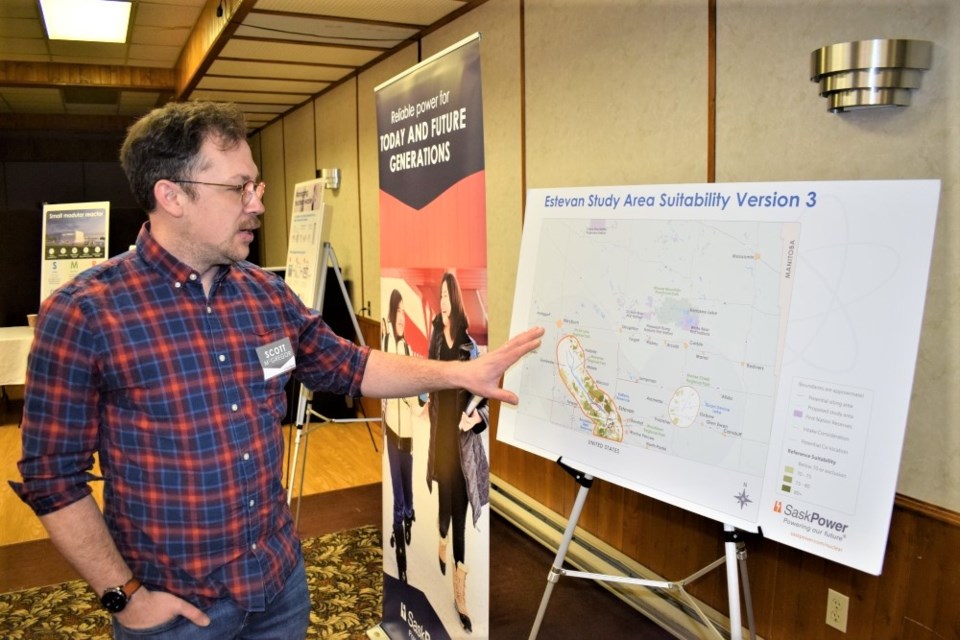The potential future for power supply options in Saskatchewan was discussed during open houses Thursday and Friday in Estevan.
The Days Inn's Taylorton Room was filled with informational placards on solar power, small modular reactors and other plans for the future. There was also information on the Southwest Power Pool project – a transmission line that will be constructed from Estevan to North Dakota so it can be used for importing and exporting electricity.
SaskPower spokesman Scott McGregor said it's important for the Crown corporation to give the public insight about what is coming next.
"We want to welcome people from Estevan to understand perspectives, hear concerns, answer questions and give information about what is the future for SaskPower," said McGregor.
Thursday night's portion of the open house was very, very busy, McGregor said, with about 50 people present during the three hours. Friday was slower, but they had what McGregor characterized as "really, really good" conversations with a number of people.
A lot of questions focused on what could happen to SaskPower workers once conventional coal-fired power generation ends, which is scheduled to happen in 2030. Others wanted to know about small modular reactors and how they would be managed.
"They want to know the economic opportunities, jobs and so on, and where we are in the process," said McGregor. "A lot of questions about how the nuclear waste is managed. We have good resources for that as well."
SaskPower has reached an agreement with the Southwest Power Pole for the 650-megawatt transmission interconnection, McGregor said. The agreement starts in 2027.
A representative of SaskPower's land department talked about the process for establishing the route, talking to land owners and more.
"Transmission lines can go both ways. It's kind of like a game of tug of war. If one side needs it and we have the capacity to go that way [we can help] … and it can go the other way as well," McGregor said.
The agreement starts in 2027.
The SPP project includes building a new switching station near Estevan; two single-circuit, 230-kilovolt power lines each six kilometres in length to connect the new switching station to the SPP; and a rerouted power line between the new switching station and the Boundary Dam Power Station.
McGregor noted in the future, the demand for electricity is going to increase due to growth in the province. Building up the generating capacity and the ability to deliver reliable power will help with reliability.
As for the federal government's deadline to phase out conventional coal-fired power by 2030, SaskPower is evaluating all options to ensure reliable power, including natural gas and importing power.
"We have a very diverse mix going into the future and yes … conventional coal won't be part of the future past 2030, but that said, we do have a number of options available to us," said McGregor.
SaskPower brought a map to the open house that showed the potential intake areas.
"These, right now, are showing what our studies have shown us so far as to what would be more suitable," said McGregor.
But he stressed they are not definitive on where an SMR could be constructed. It's just showing where their data indicates the most promise currently exists. The three for the southeast are in the Boundary Dam and Rafferty Dam areas. There aren't any around Grant Devine Lake near Alameda for now.
"That's not to say Alameda is not being considered. It's just right now these are where we're going to start doing a bit more of a detailed survey," he said.
There are also a few potential locations for the Elbow area. A decision is expected to be made next year on the site for the SMRs, and a decision on whether to proceed is slated for 2029.
SaskPower representatives also had information and supply sheets about waste, technology and water use for cooling.
The Crown corporation's representatives also fielded lots of questions about carbon capture and storage technology at Boundary Dam, and the potential for expansion to the Shand Power Station. McGregor said a decision has not been made about the future of CCS.
"CCS at BD3 is an important part of our generation," said McGregor. "The future of it, one way or the other, we'll be making that announcement once those decisions are made."
There weren't any placards promoting CCS at the open house.
If Shand won't be retrofitted with CCS technology, similar to what has happened with Unit 3 at Boundary Dam, then there has been speculation it could be converted to natural gas. A decision hasn't been made there, either, McGregor said.
SaskPower also had information regarding the 100-megawatt solar power facility that it plans to construct in Estevan. That project was announced last spring.


.jpg;w=120;h=80;mode=crop)



